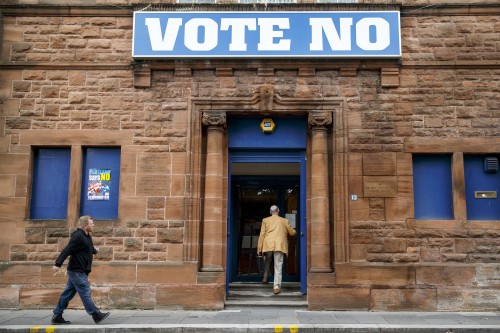 MAN ENTERS a polling station in Glasgow as Scotland goes to vote on the Scottish independence referendum on Thursday, September 18, 2014.
MAN ENTERS a polling station in Glasgow as Scotland goes to vote on the Scottish independence referendum on Thursday, September 18, 2014.Last Thursday, Scotland voted 55 to 45 percent in a historic referendum to reject independence from the United Kingdom. Voter turnout on the matter reached a record of 85 percent. Poll data from the weeks before the referendum underscored a stark schism between the two sides. Most of the differences were grounded in concern for Scotland’s finances and relations with its neighbors. To further analyze the desire of many Scots to secede, however, one must first analyze Scotland’s history with its more powerful southern neighbor, England.
England and Scotland were separate and frequently in conflict for many centuries until their unification in 1707. The union of the two countries reflected Scotland’s need for financial assistance and England’s diminished willingness to deal with hostile neighbors to the north and across the channel, not cultural compatibility. In 1934, the Scottish National Party, which sought Scotland’s eventual independence, was formed. When oil was found in the North Sea in the 1970s, the party gained further influence with the Scottish public by advocating for nationalization of the oil. Then, in 1997, Scotland formed its own parliament and was given more control of its education and health care system. In 2012, an agreement was formulated to hold a referendum on Scotland’s independence in 2014.
Scotland is a predominately liberal country governed by a conservative U.K. government. David Cameron, a conservative prime minister, embodies Scotland’s incompatibility with the U.K. to many Scots. In an effort to coax the populace into voting no to independence, David Cameron has offered more powers for Scotland. Alternatively, an independent Scotland would have to either rely either on a new currency or the Euro, which has become destabilized over the years due to financial hardships. A large number of Scots would also become unemployed if the U.K. had to pull military hardware and equipment such as its nuclear submarines out of Scotland. Finally, Scotland’s aforementioned oil production has already sharply declined after 2009. Many fear that with all of these factors in play, Scotland would not survive financially on its own.
The campaign for Scottish independence is not over because of the referendum results, however, the movement only started to gain traction six months ago and there was no expectation of such a high voter turnout. Additionally, the Scottish youth largely sides with the independence movement.
